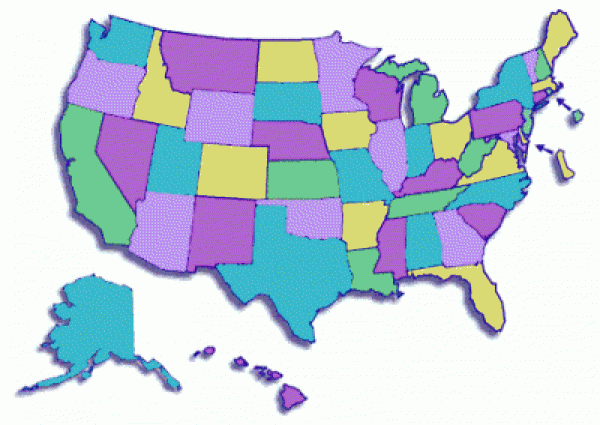US State by State Internet Poker News: A Breakdown of Each

ADI News this weekend featured a pretty comprehensive look at the potential for Internet poker on a state-by-state basis.
Thus far, only a handful of states have stepped forward to reveal they were at least considering the prospects of legalized online poker following a Department of Justice change of stance whereby The Wire Act will only be applied to sports betting. The decision, however, was only made public late last month. Nearly every legal opinion suggests that individual states now have the green light to create policy that allows for legalized regulated online poker (and other casino games) within their own borders. A rather large number of experts have also suggested that a multi-state platform in the same vein as Powerball could be adapted.
Hawaii was not mentioned in the ADI report, however, that island state is currently considering legislation that would allow for Internet poker overseen by what is now a nonexistent state lottery authority. Hawaii is the only state other than Utah that does not have its own state lottery. However, legislators are looking to create a lottery system as part of a second measure drafted. A third related measure seeks to create land-based casinos in Hawaii.
California already has a free-to-play online poker site called CalShark. Legislators are hoping to pass a measure that would allow for Internet poker with the blessing of that state’s powerful Tribal nations.
Nevada is the first state to make it lawful to operate a licensed online poker room within its borders. In fact, we could see “real money” online poker rooms opening up as early as March. Federal legislation would allow Nevada to become the epicenter of the industry, whereby they could begin taking action from all 50 states (provided a state such as Utah does not choose to opt out).
New Jersey also wants to become the epicenter for online gambling, only they are going the whole distance. The Garden State wants to legalize all forms of Internet gambling, including sports betting. Legislators were meeting behind closed doors Friday to discuss with Governor Chris Christie the option of passing a measure that allows for legalized Web poker and casino games without a voter referendum.
Iowa is seriously considering legalizing online poker and may be more willing to focus on a multistate platform due to their rather miniscule population. According to Senator Jeff Danielson, Internet poker can in about $30 to $100 million of revenues for Iowa and more than $5 billion for the nation. The Iowa numbers may be a bit skewed if the poker rooms will be strictly intrastate. The organization pushing for the Iowa initiative has gone on record as saying they only read the TwoPlusTwo.com Legislative Forum, which is a good forum to be sure, but that narrow-mindedness certainly doesn't bode well for the state of Iowa. There is a wealth of information to be had from hundreds of media outlets including a few occasional nuggets on the Gambling911.com website.
Connecticut has a Governor that is all-in when it comes to allowing legalized Internet poker. A previous contract with the state’s two Tribal casinos appears to require that they get a piece of the action. State officials and Tribal representation indicates they are prepared to work together at the onset, which is a terrific sign moving forward. We shall see.
Maine legislators attended a gaming conference in Las Vegas earlier this month and arrived at the this conclusion: “Online poker is about to explode and Maine needs to be a part of this”. The population doesn’t really support an intrastate online poker industry, but they can certainly benefit from the multistate PowerBall model. Maine is such a progressive state that Gambling911.com trusts they will be at the forefront of legalized Internet poker in one way or another despite the population handicap as well as another slight disadvantage. As of a year ago, 62 percent of Maine households had Internet speeds that were well below the national average.
Ohio was among the first states to jump into the Internet poker fray after learning of the DOJ change of stance. It is a state that can support a viable industry within its own borders too.
We’re exploring this topic,” Dennis Berg, interim director of the Ohio Lottery Commission, told The Cincinnati Business Journal on Wednesday. “We want to be in the forefront of being able to generate revenue for the lottery commission. But it’s a policy decision that we will not make on our own.”
Berg made it clear that consultation with the Governor’s Administration would be necessary, however. He offered no timeline for when a decision would be made.
Ohio is the 7th most populous state in the US with approximately 11.5 million people, which is comparable to that of the population of Greece.
Washington, DC was technically the first jurisdiction in the US to approve legalized online poker within its borders, however, the passage of this legislation has been marred by accusations of improprieties. Furthermore, there are concerns that the District of Colombia’s half million population cannot possibly sustain a viable Internet poker industry, even if that population increases during business days. The law as it is written also proposes specified “hot spots” for the activity, which just goes to demonstrate the lack of thought that went into passing such a measure.
Utah - Dream on. The state is the first to consider a piece of legislation that would allow them to opt out of any federal law.
- Chris Costigan, Gambling911.com Publisher










